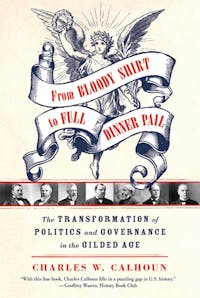From Bloody Shirt to Full Dinner Pail
The Transformation of Politics and Governance in the Gilded Age
 Download image
Download image
ISBN10: 0809047942
ISBN13: 9780809047949
Trade Paperback
224 Pages
$17.00
CA$17.00
In From Bloody Shirt to Full Dinner Pail, the historian Charles W. Calhoun provides a brief, elegant overview of the transformation in national governance and its concerns in the Gilded Age. Sweeping from the election of Grant to the death of McKinley in 1901, this narrative history broadly sketches the intense and divided political universe of the period, as well as the colorful characters who inhabited it: the enigmatic and tragic Ulysses Grant; the flawed visionary James G. Blaine; Samuel J. "Slick Sammy" Tilden; the self-absorbed, self-righteous, and ultimately self-destructive Grover Cleveland; William Jennings Bryan, boy orator and godly tribune; and William McKinley, who forged a national majority and launched the nation onto the world stage. From Bloody Shirt to Full Dinner Pail also considers how the changes at the close of the nineteenth century opened the way for the transformations of the Progressive Era and the twentieth century.
Reviews
Praise for From Bloody Shirt to Full Dinner Pail
"Calhoun has distilled a lifetime of research in Gilded Age politics into a succinct and engrossing book, demonstrating convincingly that the interlude between Reconstruction and Progressivism was far from inconsequential. There was a two decade struggle between the nationally oriented Republican Party, willing to use federal power and presidential leadership to enforce civil rights and to achieve economic prosperity, and the laissez-faire, states rights Democratic Party, that ended with Republicans as the dominant majority. That victory presaged the Progressive Era."—Ari Hoogenboom, Professor Emeritus, Brooklyn College
"In our time, the scope, cost, effectiveness, and integrity of government have again become stormy public issues. Despite all the loose parallels drawn by some present-day writers, the Gilded Age is gone, and we do not live in a new one. Yet in this accessible narrative of national politics during the late nineteenth century, the respected historian Charles W. Calhoun offers clear and convincing analysis of a period whose political divisions and issues are now manifestly relevant, and one that has never deserved its exceptionally low reputation."—Alan Lessoff, Professor of History, Illinois State University, and editor of Journal of the Gilded Age and Progressive Era
"At last, a succinct, perceptive and well-written account of national politics from Grant to McKinley. Charles W. Calhoun's engaging book delivers a comprehensive account of presidents, parties, and policies during the Gilded Age."—Jean Baker, Professor of History, Goucher College
"In this impressively succinct and insightful book, Charles W. Calhoun makes a compelling case both for the importance of Gilded Age politics and for the significant political transitions that occurred during that era."—Michael F. Holt, author of The Fate of Their Country
"A compelling read."—Jeffrey Stanley, The Brooklyn Rail
"Timely . . . A political history full of detail and biographical depth."—Zach Weir, The Post and Courier
"Lucid and illuminating . . . [A] long-overdue and sorely needed overview of American politics from the end of the Civil War through the beginning of the twentieth century."—Kirkus Reviews
"A specialist on American political history between Abraham Lincoln and Theodore Roosevelt, Calhoun here delivers an insightful survey of the period. Keen to modify the times' reputation for scandal and scant historical consequence, he covers the public issues and political personalities in play in the competition between and within the Republican and Democratic parties. Proceeding chronologically through each national election from 1868 to 1900, Calhoun describes how putative presidential candidates jockeyed for nominations, how victor and vanquished interpreted election results, and the disposition of campaign pledges by the ensuing political alignment in Washington. As Calhoun's title suggests, the ground on which elections were contested shifted from Reconstruction and the civil rights of blacks to economic issues, with the Republicans tending to favor activist government and Solid South Democrats, minimal government. Noting what scandals did erupt, Calhoun ascribes their salience to voters as minimal compared with the Panics of 1873 and 1893 or partisan positions on civil service reform, tariff rates, and silver coinage. An eminently readable historian, Calhoun will click with fans of politics and the political past."—Gilbert Taylor, Booklist
"The politics of the late 19th century, or the Gilded Age, is the subject of this short history, and the author hopes to draw parallels between then and now. Voter turnout often surpassed 75%, political scandals were abundant, and odd third parties and flamboyant figures captured the public eye. The era has given Calhoun plenty to chew on, and the author, manifestly passionate about his niche, suggests that we are missing the implications of the historical drama. Unfortunately, by filling his book with a bewilderingly pedestrian barrage of facts, he fails to draw a persuasive parallel. Either too determined to be brief, or too loyal to his single-minded premise, Calhoun's summary of the era's politics is scholarly, complete, and bone dry. While its central impetus, the shifting balance between the influence on politics of moral issues and brute economics, is a worthy anchor point, the sheer stultifying force of endless dithering over tariffs, monetary policy, in-fighting, and partisan bickering is too strong."—Publishers Weekly


